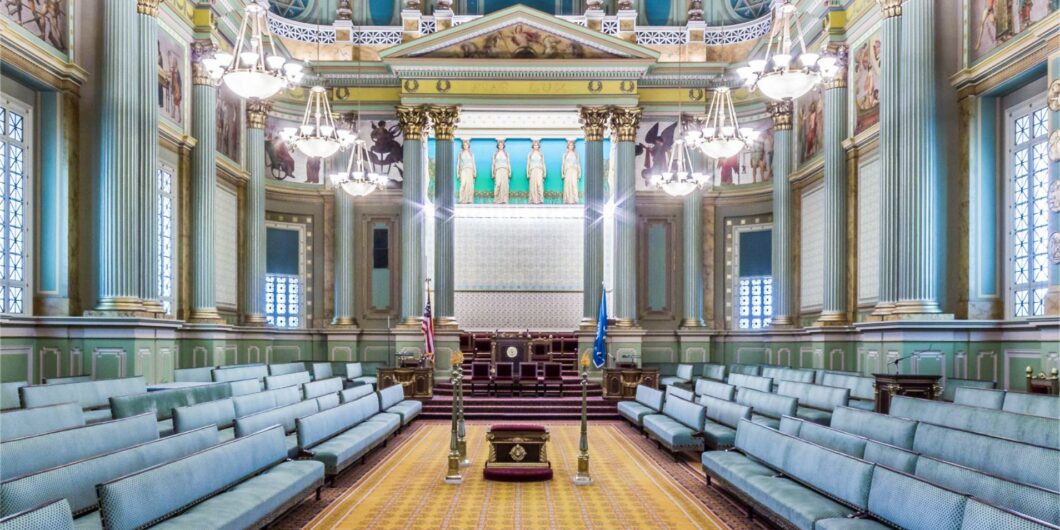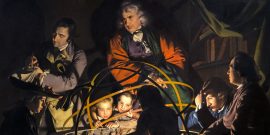Instead of thinking politically about philosophy we should be thinking philosophically about politics.
Poetry’s Place in the World
The quarrel between philosophy and poetry has a long and contentious history, but it is not without its moments of fruitful alliance. The alliance of these two quarreling foes often arises from a recognition of the composite nature of the human being. As in the paradigmatic case of the Platonic dialogue, the philosophical use of poetic form reminds us that reason is everywhere and always instantiated in individuals thinking within particular historical and political circumstances. Human rationality as embodied always arises from a finite being with particular needs, desires, and hopes. Poetic philosophical works enable us to scrutinize the way such hopes and longings not only distort our attempt to give an account of who we are and the world in which we find ourselves but also come to determine which questions we ask in the first place. In this way, the philosophical use of poetic form often highlights the psychological obstacles that stand in the way of rational inquiry and prudent action; in such works, the poetic form is the tribute reason pays to its embodiment in a passionate being.
Richard Velkley’s recent novella, Sarastro’s Cave: Letters from the Recent Past, is a remarkable addition to the long tradition of philosophical poetry or poetic philosophy. It is an epistolary novella that chronicles the adventures in the thought of Clovis Mendling, a history professor at a university in Louisiana who has a special interest in the history of the Freemasons. This interest explains, in part, the meaning of the novella’s title and its reference to Sarastro, the head of a masonic-like society in Mozart’s The Magic Flute. The title suggests that the legacies of the Enlightenment project, especially those that are often unnoticed, will be a guiding theme of the work; and it further brings to mind the open conspiracy among those great modern thinkers who sought to transform the world through the propagation of rationalistic philosophy.
There are 33 letters (delivered via email) written to six intellectuals—a poet and literature teacher, a mathematician at a scientific research laboratory, a polyglot and translator, a political scientist, a composer, and Mendling’s bright and promising young student. Mendling’s letters are framed by an account of how Richard Velkely, the “editor” of this one-sided correspondence, discovered them through a chance encounter with a young park ranger while visiting a historic Civil War battlefield. The letters are followed by an account of how Velkley later learns the story of Mendling’s tragic fate, the knowledge of which Velkley claims makes the formation of these letters into a novella possible.
The letters begin with Mendling’s account of a personal disruption that has “ontologically” transformed him. After a medical emergency in a foreign country, Mendling questions what it means to be human. The emergency causes a “wholly personal revolution” that leads to an unraveling of Mendling’s sense of self and a loss of faith in his most cherished ideals. Mendling feels an alienation from himself, a doubling otherness, that he attempts to express throughout his letters with various poetic images or philosophical thought experiments—he wonders, for example, if he is a machine, if he exists in an identical but parallel universe, or if he is “a ghost on the battlements of the present age.”
This personal transformation coincides with “political upheavals” that furthers Mendling’s crisis. The composition of the letters begins around Donald Trump’s announcement of his presidential candidacy and ends just before his election to office. Mendling is disturbed by Trump’s descent on “the escalator in the gilded lobby,” which portends Mendling’s Orphean descent into “the netherworld of the mind.” Whatever the precise cause might be, the confluence of the personal and political leads Mendling, once a believer in the “highest moral and rational ideals” of the Enlightenment, to lose faith in the project to achieve “brotherhood, justice, and reason among nations and individuals.” It should be noted that what attracted Mendling to Freemasonry in the first place is the “odd ambiguity” that they were dedicated to the promotion of “the highest moral and rational ideal” while operating in “secrecy and cultivating arcane mysteries.” Mendling is puzzled by the ways in which the ideals of Enlightenment universality are in tension with the contingencies of human particularity.
Having lost faith in the Enlightenment’s promises, Mendling’s letters depict his attempts to work through the problems raised by his newfound sense of intellectual homelessness. They cover an incredible breadth of topics, especially when one considers the novella’s short length, ranging from reflections on Descartes’ evil genius to an analysis of Federico Fellini’s 8½ to a concluding “musico-philosophic history” of modern thought. The letters depict Mendling’s desperate search to find a new “grand narrative,” a closed horizon in which he can discover a sense of unity or wholeness. As Velkley, the editor, notes in his conclusion, Mendling “lives in the world of the Enlightenment” but “passes, in some respects, through Romanticism and existentialism.”
Velkley seems to suggest that Mendling never escapes “Sarastro’s cave” because he has not thought sufficiently about the Enlightenment premises that determine his thinking. He harbors the hope that the “odd ambiguity” of human life, characterized by the tensions of the masonic society, can be resolved into a harmonious account of the whole (and harmony is a key word as the theme of music, as an expression of the problem of human unity, runs throughout the entire novella). But Mendling cannot resolve all the discordant notes that enter his life and thought.
The persistent tensions of human nature compel Mendling to continue asking questions that push his thought beyond the bounds of any closed horizon. Accordingly, Mendling is too intelligent and too restless to conclude that such harmony is within his grasp. In the final letter, addressed to “all,” Mendling admits that he has failed to find the unity of life and thought he seeks. He will give up on his attempt to transform his life into “a work of art” (a claim belied by the fact that he hands over his manuscript to his friend for completion). The subsequent letters to his recipients will come without “hope of purity or designs of wholeness.”
But this is only part of the story. As one goes through the letters, another narrative arc emerges that makes it clear that Mendling is not merely a disembodied mind communicating through the ethereal medium of the internet. Mendling becomes jealous that a student of his, Myrna Limnwood, becomes involved in a close and erotically charged friendship with Vance Fetterlich, his friend/letter-recipient in London. This portion of the plot continues into Velkley’s conclusion, where it is revealed that Mendling has died, having fallen into a cavern while hiking with Myrna (a fact one also finds out in the summary on the back of the book). The added detail that Mendling is holding Myrna’s umbrella, which Myrna joked about having always carried for self-defense, easily leads one to dark imaginings.
Velkley does not necessarily lead us to a wholesale rejection of the Enlightenment but instead shows us that, without a continual examination of its premises, we risk, in Mendling’s words, forgetting “the bases of civilized life” as we follow a “general decline into tribalism.”
Velkley’s insistence that the details of Mendling’s harrowing death allow the letters to form a novella quickly leads one to conclude that there is some connection between Mendling’s failure to think through his crisis and his untimely demise. While not spelling out the precise nature of the connection, Velkley proclaims that the reader may not be surprised that his thought “wandered down some dark avenues connecting the events of the cavern to Mendling’s letters to Vance and Myrna.” Velkley wonders in particular whether Mendling was suffering from “some self-inflicted wound” indicated by expressions of regret made to Vance regarding his failures to “live musically.” Whatever may have actually happened in Mendling’s descent into the cave, Velkley, the editor, inserts his own imaginative conjectures into the narrative and insists that we read the letters in light of their author’s ultimate demise. If the reader had not already come to suspect faults in Mendling’s thinking, the conclusion proposes that what makes Mendling exemplary is his failure.
In the most self-referential moments of the letters, Mendling reflects on the epistolary form, claiming his letter writing is an attempt to reach self-knowledge. Mendling asserts, “The most pressing reason I have for writing letters is to discover myself—my questions, problems, and quirks—in the perspectives of others, or in the imagination of those perspectives.” Once the novella is completed, Mendling’s imagined friends would “become impalpable ghosts who summon me toward acts of reflection, self-reckoning and a final judgment.”
One detects a darkly comic irony running throughout the letters that, despite his efforts, Mendling’s failures are due precisely to a lack of self-knowledge. When a real, non-imagined person brings Mendling to the possibility of self-reckoning, he shows himself incapable of meeting its harsh demands. We get a hint in his only letter to Myrna that she has chastised him for an eccentric display of “classroom acrobatics” by comparing him to the narrator of Edgar Allen Poe’s “The Tell-Tale Heart.” In this remarkable letter, Mendling recounts Poe’s story while adopting the perspective of the murderer. The point Myrna seems to be making, and that Mendling’s retelling of Poe’s story supports, is that Mendling is governed by his imagination and ruled more by passion than reason.
All this is complicated by the fact that Mendling chose to include his less-than-flattering response to Myrna’s letter in his collection, and, indeed, the whole thing might even be his creation. If this is the case, Mendling seems to be indulging in the kind of postmodern irony that confuses self-reference for self-knowledge. In one letter, Mendling provides an insightful reading of Samuel Johnson’s novella, The History of Rasselas, Prince of Abyssinia, drawing out the need to discipline the imagination. Here he seems to be on the path to a kind of self-knowledge that he identifies with the Socratic project. Through the imagination, we come to be ruled by things that are not there, absences made present much like the imaginary recipients of Mendling’s letters.
But despite this recognition of the power of the imagination to determine our thought and action, Mendling cannot escape its grasp because he is unable to become fully aware of his erotic longings, both his physical desire for Myrna and his desire for a beautiful account of the whole. These yearnings determine the nature of his thinking down to the way in which he formulates the problems that consume his speculations. One might wonder if Mendling dispenses too quickly with the “Platonic philosopher,” whom he only mentions in passing.
Velkley prepares the reader for the kind of Socratic education that eludes Mendling. He shows us that such an education begins for us moderns with a genuine examination of the premises of the Enlightenment, which still shape our political thought and moral psychology. Our politics, from the most progressive to the most reactionary, tend to harbor the hope for a harmonious fusion of beauty and truth that is inspired by the Sarastros and Freemasons of the Enlightenment, but without an awareness of the historical circumstances and philosophical problems that motivated the postulation of premises we often take for granted.
Velkley thus does not necessarily lead us to a wholesale rejection of the Enlightenment but instead shows us that, without a continual examination of its premises, we risk, in Mendling’s words, forgetting “the bases of civilized life” as we follow a “general decline into tribalism.” The novella leads us to the consideration that the premises of this great philosophical-political project in fact revolve around a set of questions that deal with what sort of being we are and our relation to the world. It is the openness to the mystery of the odd ambiguity of our being that prepares us for the exercise of practical prudence and the search for wisdom.



